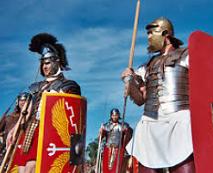In order to determine the meaning of century, it is necessary to know, first of all, what the etymological origin of the aforementioned word is. In this case we can determine that it derives from the Latin "centuria." Specifically, it is the result of the sum of two clearly defined components:
-«Centrum», which means «one hundred».
-The noun "viria", which is equivalent to "group of men."
The first meaning of century mentioned in the dictionary of the Royal Spanish Academy ( RAE ) refers to a century or a centenary : a period of time that extends one hundred years .
 For example: "During the last century, the economy of the Asian country grew by 684%" , "It has been a century since such intense rains were recorded in this region" , "In half a century we went from being a small family business to a large multinational corporation .
For example: "During the last century, the economy of the Asian country grew by 684%" , "It has been a century since such intense rains were recorded in this region" , "In half a century we went from being a small family business to a large multinational corporation .
The idea of century is also used with reference to a military unit of the Roman Empire that was composed of a hundred soldiers . The centuries were the most important structures of the army , allowing the development of the legions (units that could exceed 6,000 men).
Beyond the name and definition mentioned by the RAE , the centuries, according to various historians, did not really have one hundred troops. They used to have between sixty and eighty, distributed in the so-called contubernios .
The leader of a century was called a centurion . This military authority had lieutenants as assistants in carrying out its functions. The centurions were in charge of directing the centuries on the battlefield and those responsible for its organization.
When two centuries joined together, they formed a maniple . The maniples, for their part, used to group together in threes to give rise to a cohort . The cohorts, in turn, were the structure of the legions .
Within the celebration of Holy Week in Spain, it should be noted that there are many steps that take to the streets accompanied by Roman centuries, many of which are performing different processional marches. In this case, it must be established that the first centuries of this type are considered to have appeared in the 17th century. Exactly the first one that is known is one from 1658 that accompanied the departure of the Sevillian Macarena.
These types of centuries have acquired so much weight in the context of the celebration of the aforementioned Passion Week that different events about them have been taking place throughout the country. Thus, for years, concentrations of Roman centuries have been organized in towns such as Villanueva de Córdoba (Córdoba-Spain).
Within the set of prophecies made by Nostradamus, the centuries also take center stage to divide them. An example is that he established in the 1st century LX quartet the "birth of an emperor who will be born near Italy who will cost the empire a high price."
Centuria , finally, is the name of a town located in Polk County, in the state of Wisconsin ( United States ). Its population does not reach a thousand inhabitants.
